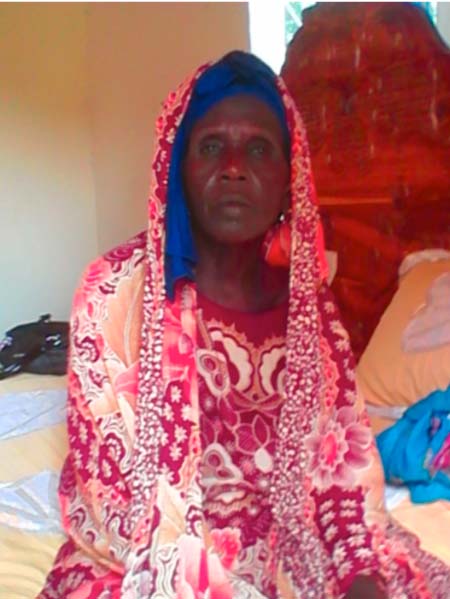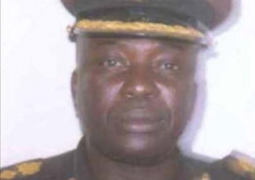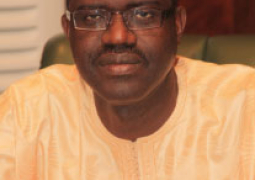
When told that the Demographic Health Survey 2013 stated that 55 per cent of girls are cut at the age of 5 years, she said “where did that come from, because FGM/C Camp or ‘Jujuwoo’ is no child’s playground, we cut women and not children.”
Grandma Karamo Kassama in her 80s looks old, but has not forgotten the way they started cutting their daughters in what is now known to us as Female Genital Mutilation or Cutting (FGM/C).
Grandma Kassama welcomed me in her house on the day of Yawmul Ashura (Muslim New Year), dressed in a flowery garment that covered her entire body.
The first thing she told me, in the Mandinka language, was: “I hope you are not among those who want to kill our tradition. Today I will have to broke the silence and put the records straight.”
Indeed she broke the silence. Read on:
How did the practice start?
Grandma Kassama: Some say it started as a result of the rivalry and enmity between co-wives. There was a man who decided to marry a second wife, who was younger than his first wife. The first wife got jealous and decided to torture the younger wife, in such a way that their husband will not even love her anymore.
So the first wife took a needle and start pricking the lips of the second wife, and they got swollen to an extent that she cannot even talk. When their husband returned home from work, he met the second wife in that state and said that the second wife looks even more beautiful with her swollen lips.
The first wife got even more jealous because of that statement, and took a needle again and pricked the ears of the second wife. When the husband returned home from work, again he made the same statement.
Finally, the first wife in anger again cut the clitoris of the younger woman, her co-wife, saying that now the husband will send her packing. Instead, the husband took care of the wife until she got better, and appreciated that too.
After that, people continued the practice and then, religion, Islam accepted it as a good one. Since then we keep on practicing it as a Sunnah of our religion, with culture also having a role in it.
About background of a “Nyangsingbaa” circumciser, blade used:
Grandma Kassama: “Muru Kungkoyo”, “Nabaajo”, an instrument with a knife like shape with a white head-handle and smaller than a knife, is what we used then to cut women during circumcision.
It was inherited from one person to another. Then, to practice FGM/C is by inheritance. It has to be in one’s blood or family and if one practiced it and dies another person in the same family, who is the next in line, will inherit the knife “Muru Kungkoyo”.
We used one knife “Muru Kungkoyo” and there was nothing like sicknesses, birth complications; and we don’t cut children. The “Jujuwoo” is no child’s playground, so we cut women some of whom are even in their marital homes; because I could remember my daughter was married, when she was cut.
But now, we have seen people practicing because they are fit to do so, but then the tradition is that you have to inherit it before practicing it.
Nothing is happening now; you called yourselves “Toubabs”, and you are neither “Toubabs nor Mandinkas”.
The circumcisers now are not real. Then it was not like, you have a lion’s heart, and you become “Nyangsinbaas.”
This tradition had to be in your family before you can become one. It is inherited and passed on from one family member to the other.
If a particular Nyangsinbaa is supposed to perform circumcision, the whole village will come together to go and greet that circumciser. During that dance people will crawled on their knees, turning back and front to meet the circumciser.
There will be dancing up to where she lives, and she will confirm that, that year, there will be circumcision in that village. After she had confirmed then each would-be initiate will pound “tiafutu mirandingo” or “Mbudake” for her as a sign of respect and gratitude.
FGM/C process:
Grandma Kassama: when we are ready to circumcise our daughters, all would-be initiates will be told that tomorrow is a big feast of a particular fruit like “Pakaya domoo”, meaning pawpaw.
All the “Solimas” in the village will be happy, jumping from one corner to the other. Then in the evening, everyone will be collected from their homes and placed in one big room and there will be dancing throughout the night.
Before dawn they will all be taken to the forest under one big tree. Before sunrise all the parties involve will head to the forest.
We circumcised in the forest, deep in the forest and far from the homes.
We have people we called “Sonlingo”, who will pick up the “solimas”, the would-be initiates, and place them on their backs while “Bamba” circumciser will be hiding behind the biggest tree in the forest.
The one who held the woman to be circumcised will be sitting down with her legs spread on the ground, and when they bring the woman they will placed her head on the laps of the holder sitting on the ground.
If there happens to be a slave in the midst of would-be initiates, she will be the first to be circumcised. The owner of the camp, called “jujutio”, owner of the camp, as tradition demands is the daughter of the Alkalo of the village. During circumcision, she is the last person to be circumcised.
When all that is done, that is the time the “Bamba” circumciser will come out from her hiding place with her face fully covered, and will cut the women who will not see her face.
The circumcisers face is not meant to be seen by the initiates until the day they are well and about to return home. They will be cut before the sun gets hot, because if the sun is hot there will be lots of blood.
After that, it will be time for what we called “nyakuwoo”, washing the face, which involves washing where they cut. After that, they will walk them to their camp, “Jujuwoo”, which is also situated in the forest.
We walk them to the camp, because like I said, at that time we don’t cut children but women. When they get there they will sit on mats in a row each with their “Kintango”, a guide, and there will also be an overall camp or “Jujuwoo” guard called “Karamba”.
The guard or “Karamba” does not sleep; she is awake all the time. “Karamba” is not an ordinary person, because anything that happens or is about to happen she has to know about it to do something to prevent it, and will also be a fighter.
“Cottondi kuloo”, cotton seed, is what we used then to treat the wounds of initiates. We pound it into powder, put it in water and paste it with a piece of cloth to dress the wound of the initiates. We used the same cotton seed to wash the wounds, tear a piece of cloth and tie it around them.
But now I have seen the modern “Nyangsingbaas” using modern medicine to treat the wounds. I also see some of them using tomato paste and other ingredients that we didn’t use in the past. The camp is like a school where the initiates are thought secrets of womanhood, culture and life.
Then we had two different types of circumcisers, called “Bamboo” and “Kaanaa”. If you go to “Bamboo yaa”, the “Nyangsingbaa” if she cut you and it is not clean, you will be given away to “Kaanaa” the cleaner, and she will clean you up. This form of practice was the strictest one, and some women went through and they did not die.
“If this kills people, as they are saying now, I don’t know how it is killing because no one died in our hand, as strict as it was then; not to talk of now when the strict measures are no more being observed by the modern circumciser.”
“Saabaa laa dinka to mbenna silo kang, saa kaa singking, Mborr ta Nga Farra taye farra fuloo taye, saa kaaa singking, Mang hanyi Bamba nya saakaa terr Kaanaa woy kaanaa. Nkoto Kaanaa Beh Faroo to faro beh kalingjee woo kalingjee”, this was the song we sing for these two circumcisers, “Bamboo and Kaanaa”.
When they are well and about to return home from the forest, on that day we will burn all the clothes they used during the process, and the initiates will sit in the middle of the smoke.
Then they will see the face of the circumciser who had cut them. What happened in that forest remains a secret; no one is allowed to explain that to those outside who did not undergo it; and you only get to know it when you undergo it. This is “Musu wuloo”, women’s camp, and when you narrate whatever happened there, you die.
The initiates stay in the camp for more than two weeks. Then during the course of those two weeks, when they get better, then it is now time for the passing out preparations.
The initiates will be taken to a well outside the forest to be washed there. Each of the initiates will be accompanied by their guide, “Kingtango”, who will rush to wash them.
They will then remove the clothes they used in the process, and give them clean clothes; they tie one cloth around their waist and one around the neck.
We will take animal skin to the “Faraba” to work on it by sewing it nicely with coins, cowries and tie it on them like a shirt, plait their hair, mixed with animal skin, beads, cowries and coins.
At the back of the plaiting, they will attach a long bead called “yoroo”; and at the end of the “yoroo” a coin will be attach to it. If the initiates is walking that will be swinging behind her.
We will take a traditional cloth, called “Fataro”, fold it and placed it on top of her head.
The initiates will look more beautiful than any beautiful creature on earth that day. Each step they take is accompanied with style, appealing to rhythm of the drums.
They will be then taken to the village square “Bantaba” for the actual passing out ceremony.
What do you think of a ban?
Grandma Kassama: A ban on the practice is unthinkable; this is what we do, it is culture and when our religion, Islam, accepted it as Sunnah, a ban is impossible.
A ban means killing one’s culture, and culture is identity; identity is the pride of any man; so, therefore, a man will do anything to protect his identity.
So those talking of banning the practice, the earlier they quit the better for all of us, because this practice is here to stay; it shall stay!
EndFragmentRead Other Articles In Article (Archive)
NYP Speaker Off to US
Aug 14, 2008, 6:02 AM




